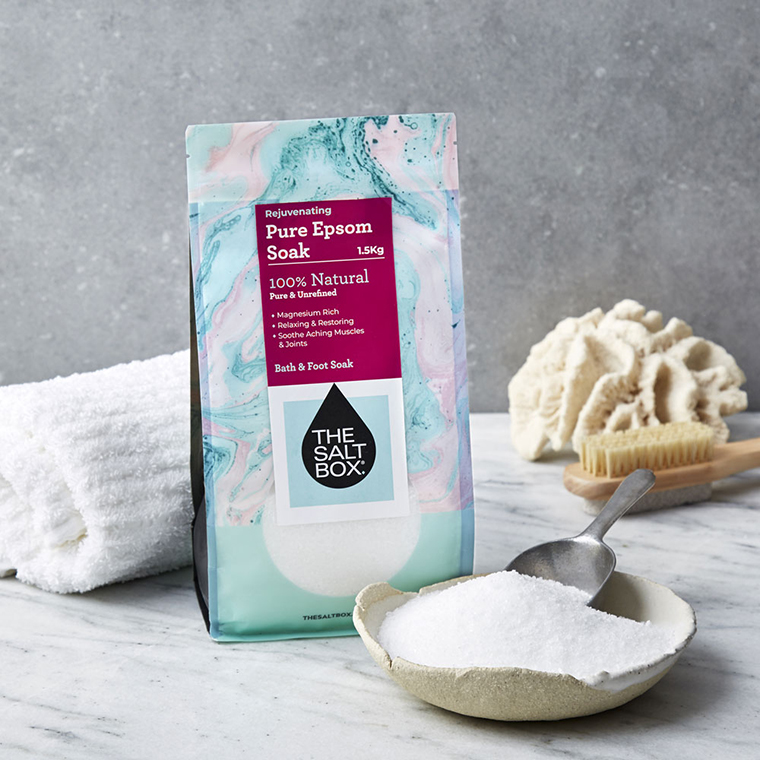Magnesium Flakes vs Epsom Salt: What’s the Difference and Which is Right for You
Posted by The Salt Box on 5th Apr 2018
If you’re looking to reap the health benefits of a magnesium-enriched bath, there are two main options to consider: magnesium flakes and Epsom salt. The latter has long been lauded for its restorative and therapeutic qualities, and you’re likely to find a box or bag tucked away in household cupboards around the world.
Magnesium flakes, or magnesium salts, are a comparatively new commercial bath salt, though the benefits of magnesium soaks have been known and utilised since ancient times.
So what are the keys difference between the two? And what is right for you? Let’s take a look.

A soak in a magnesium-rich bath is an excellent way to relax and restore. But which bath salt is right for you, magnesium flakes vs Epsom salt?
Magnesium Flakes and Epsom Salt
Magnesium salt and Epsom salts are chemically different. And, interestingly, neither are 'salts' per se. Magnesium flake is a compound of magnesium and chloride. Whereas Epsom salts are a compound of magnesium and sulfate.
Magnesium is an essential mineral that plays an important role in over 300 biochemical functions in the body. However, it is also one of the most common mineral deficiencies found in adults, and many healthcare professional recommend taking supplements. Magnesium chloride is the compound that you will find in most magnesium supplements.
A magnesium salt bath is an excellent option for those with a magnesium deficiency, or who are looking to supplement the magnesium ingested in their diet.
The benefits of a magnesium bath include helping:
The benefits of Epsom salt are much the same as magnesium chloride, due to the significant magnesium content. It also provides powerful anti-inflammatory effects, reduces stress, eliminates toxins in the body and relieves muscle aches and pains.
So What’s The Difference and What’s Right For Me?
From a glance, the two seem quite similar, and in many ways they are. When either magnesium sulfate or magnesium chloride is dissolved in water, they go through a rapid process of dissociation. On a molecular level, the magnesium sulfate compound dissociates into one magnesium ion and one sulfate ion, and magnesium chloride becomes into one magnesium ion and two chloride ions.
This means that the key difference between the two lies in the partner compound: either sulfate or chloride.
Chloride is very important for balancing electrolytes levels in the body, which is crucial for maintaining overall health. Electrolytes help conduct small electric currents within the body, and are required in cells found in tissue, nerves and muscles. If an electrolyte imbalance occurs, it can affect the balance of acids and bases in your body, and the way fluid travels in and out of your cells, leaving you feeling dehydrated and unwell. A magnesium flake bath is a great way to boost and balance the levels of chloride in your body.
Magnesium salt baths are also ideal for children or those with particularly sensitive skin as the sulfates and other minerals found in Epsom salts and Dead Sea salts can be irritating for some.
Sulphate is another key mineral for optimal wellbeing. It is important for metabolic processes, and for the function of proteins and insulin. Deficiencies are linked with inflammation, various muscle and skeletal disorders, and diabetes. So a long soak in an Epsom salt bath is a great way to ensure the sulphates levels in your body are balanced.
When it comes to choosing between magnesium flakes and Epsom salts, it really comes down to what works best for you. If you’re looking to enjoy the wonderful restorative qualities of magnesium, take a look at our bath salt range.



